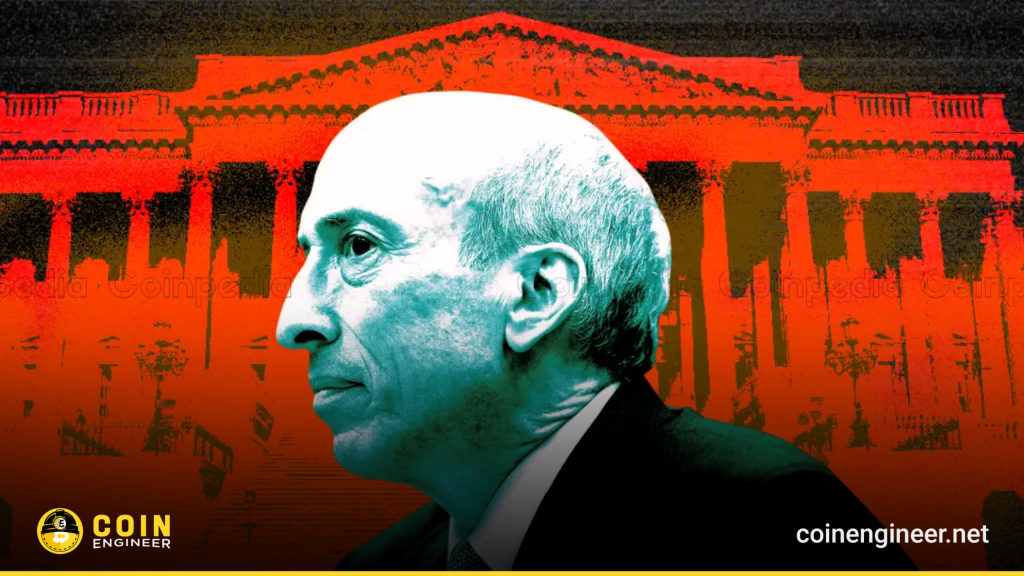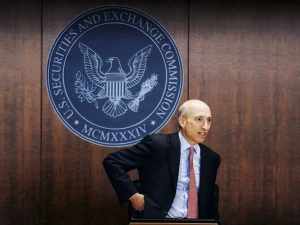Gary Gensler’s Announcement to Step Down as SEC Chair on January 20, 2025, Sparks Expectations for Change in Crypto Regulation
Gary Gensler’s tenure as SEC Chair was marked by a strong enforcement strategy prioritizing investor protection, though it faced criticism from some quarters for stifling innovation.
SEC’s Legal Actions and Industry Response
Under Gensler’s leadership, the SEC filed lawsuits against major crypto platforms like Coinbase, Kraken, and Binance, alleging violations of federal securities laws. These lawsuits focused on claims that these platforms failed to properly register as exchanges or brokers. Gensler’s classification of most cryptocurrencies as “securities” became a major point of contention in the industry.
For instance, Coinbase argued that the current regulatory framework is incompatible with the decentralized and global nature of blockchain technology, highlighting a lack of regulatory clarity. This has reignited calls for updated legislation that balances innovation with investor protection.
What Changes Lie Ahead?
The SEC’s new leadership is expected to bring a different approach to crypto regulation. Former SEC enforcement attorney Ladan Stewart suggested the new chair might prioritize settlements to resolve ongoing lawsuits. However, an agreement acknowledging the SEC’s authority over secondary token sales might provoke backlash from both the industry and some policymakers.
Potential candidates for the SEC chair role, such as Robert Stebbins, Paul Atkins, and Teresa Goody Guillén, are anticipated to bring diverse regulatory perspectives. Regardless of who is chosen, there is hope for a more collaborative regulatory approach in blockchain oversight.
Legislative and Judicial Dynamics
Legislative dynamics could further complicate the SEC’s regulatory goals. The Congressional Review Act (CRA) could play a critical role in overturning proposals deemed overly restrictive. For instance, if Regulation ATS—which aims to classify decentralized platforms as exchanges—is approved before Gensler departs, it could face repeal under CRA.
Meanwhile, judicial decisions are increasingly serving as checks on the SEC’s broad interpretation of securities laws. A federal court in Texas recently invalidated the SEC’s “dealer” rule, citing overreach. Such rulings signal growing judicial scrutiny of SEC actions and a potential shift toward more balanced regulatory enforcement.
Ongoing Challenges
The crypto industry views Gensler’s departure as an opportunity to rebuild relationships with regulators. Organizations like the Texas Blockchain Council suggest that settlements with platforms like Coinbase and Kraken could pave the way for clearer compliance guidelines. However, the ultimate goal remains the implementation of a comprehensive regulatory framework that fosters innovation while ensuring investor security.
A Turning Point for Blockchain Regulation
As the SEC transitions to new leadership, the approach to regulating cryptocurrencies is expected to evolve. This new era, shaped by legislative reforms, judicial interventions, and administrative settlements, will be pivotal in crafting policies that recognize the transformative potential of blockchain technology while safeguarding the public interest.
You can also freely share your thoughts and comments about the topic in the comment section. Additionally, don’t forget to follow us on our Telegram, YouTube, and Twitter channels for the latest news and updates.



